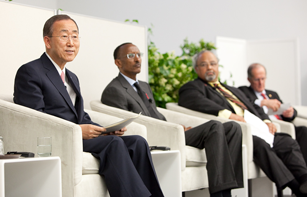
Press Release
World leaders renew commitment to AIDS, health and sustainable development
08 June 2011 08 June 2011
(Left to Right): United Nations Secretary-General Ban Ki-moon, President of Rwanda Paul Kagame, United States Global AIDS Coordinator Ambassador Eric Goosby, President of the General Assembly Joseph Deiss at the Heads of State event - AIDS, Health, and Development, held at UN Headquarters, NYC, on June 8, 2011
Credit: UNAIDS/B.Hamilton
NEW YORK/GENEVA, 8 June 2011—More than 20 Heads of State and Government have come together at a special event focusing on leadership, cooperation and country ownership in the response to HIV. The event, attended by close to 400 people, was held during the United Nations General Assembly High Level Meeting on AIDS to renew commitment and identify opportunities in scaling up the HIV response, improving health and achieving the 2015 Millennium Development Goals.
The President of Rwanda, Paul Kagame, hosted the debate which outlined ways of accelerating action to help countries move closer towards universal access to HIV prevention, treatment, care and support.
He outlined three main areas as key to the success of the AIDS response: leadership, ownership and collaboration. “Not a single country, not a single individual, business or entity can win this struggle alone,” he said. “Once the leadership and commitment is there in any country and any community, results begin to show.”
The need to increase access to services for people most vulnerable to HIV and respect for human rights was central to the discussions. Strong and visionary leadership combined with commitment and global solidarity around HIV were underlined as essential to moving the response forward.
“We can bring HIV deaths and new HIV infections to zero,” said United Nations Secretary-General Ban Ki-moon. “Our targets may seem ambitious but they are achievable if we are united.”
Leaders at the event also looked to the future of the HIV response and the importance of investing in youth as the leaders of tomorrow and encouraging their full engagement in the AIDS response.
“If we want to transform the response, we have to bring a new agenda for the future,” said Michel Sidibé, Executive Director of the Joint United Nations Programme on HIV/AIDS (UNAIDS). “This will only be achieved if we engage young people to lead a new social movement around AIDS and ensure a sustainable response.”
The speakers stressed the need to overcome the challenges to sustainable and predictable financing. In a report launched ahead of the High Level Meeting on AIDS, UNAIDS outlined that US$ 22 billion will be needed by 2015 to halve new HIV infections and expand access to HIV treatment. However, the report also revealed that international funding for HIV had declined from 2009 to 2010.
“What we need is resources, best policy, and law to ensure and protect the rights of people living with HIV,” said Ms Anandi Yuvuarj, Regional Coordinator of the International Community of Women Living with HIV. “Everyone must have access to HIV prevention, treatment, care and support, particularly people most vulnerable to HIV.”
Speakers emphasized the need for systematic improvement of the efficiency and effectiveness of existing AIDS and health spending, as well as the importance of ensuring the best value for money through effective and efficient HIV programming. In addition, they discussed the need for countries to look for new streams of revenue from domestic, regional and international sources.
Success in South-South cooperation efforts were discussed as an effective way of finding new paradigms of development and sharing innovation within regions for an accelerated response to HIV.
Leaders attending the event pledged to increase efforts to improve the effectiveness, efficiency and sustainability of their national AIDS responses to accelerate progress towards achieving universal access to HIV prevention, treatment, care and support services.
Press centre
Download the printable version (PDF)
